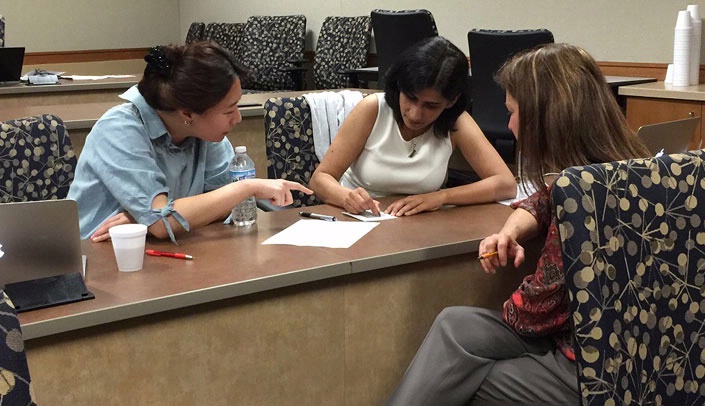Fifteen UNMC faculty members recently completed the Performance Improvement in Teaching Series, a weeklong training program focusing on innovative teaching strategies that move beyond a “sage on the stage model.”
“The Office of Faculty Development has been offering this type of individualized training for nearly two decades, yet the modern day teaching environment is far different than it was 20, 10 or even five years ago,” said Linda Love, Ed.D., director of the program.
Participants
Faculty participating in this year’s Performance Improvement in Teaching Series were:
- Lorena Baccaglini, D.D.S., Ph.D., COPH-Epidemiology
- Danish Bhatti, M.D., COM-Neurological Sciences
- Sam Bierner, M.D., COM-Physical Medicine and Rehabilitation
- Catherine Binstock, CON-Omaha Division
- Wael ElRayes, M.D., COPH-Environmental, Agricultural and Occupational Health Science
- Nicholas Guenzel, Ph.D., CON-Lincoln Division
- Kim Haynes-Henson, M.D., COM-Anesthesiology
- Colleen Kennedy, CON-Northern Division
- Jungyoon Kim, Ph.D., COPH-Health Services Research and Administration
- Sara May, M.D., COM-Internal Medicine
- Veenu Minhas, Ph.D., COPH-Epidemiology
- Nagamani Narayana, D.M.D., COD- Oral Biology
- Judy Neville, COP-Pharmacy Practice
- Anne Skinner, CAHP-Health Services Admin
- Kathleen Volkman, CAHP- Physical Therapy Education
“It is certainly different than when many of our teachers were learners in their health science programs. Teaching is not as simple as standing up and spewing out information during a one-hour lecture — not by a long shot. We are lucky at UNMC because there are plenty of people who want to help our students have the best learning environment possible.”
Colleen Kennedy, an instructor at the College of Nursing-Northern Division, said she planned to incorporate changes into her lessons after the series, including adding more low-stakes testing, spacing of information with brief reviews of materials covered previously, using more pictures and fewer words on PowerPoints, and other innovations.
“The most helpful part for me was being able to sit down, one-to-one with an expert, and ask for as many teaching suggestions as I needed to my satisfaction,” she said. “The support crew for this was fabulous. Also, working with others from various medical professions and observing different teaching styles was very valuable for improving on my own teaching style.”
Technology is an integral part of 21st-century learning, said Faye Haggar, co-director of the series.
“As a result, technology has become vitally important in faculty development,” she said. “Our series was developed to cultivate meaningful changes in both teaching and technology use in courses. Technology was never the major focus, but rather embedded within the Performance Improvement in Teaching Series’ content and pedagogy. I’m excited to continue working with the campus community to build more engaging courses.”
Geoff Talmon, M.D., director of the Interprofessional Academy of Educators, praised the commitment of series participants to improve their teaching skills.
“This will benefit not only them, but their current and future students,” Dr. Talmon said. “The participants saw firsthand the impact that small, thoughtful changes can have on their teaching effectiveness and the value of collaborating with their peers in education as they regularly do in the clinical arena. We hope that they can go back to their units and preach to their colleagues that they can do the same things.”
“This is an important partnership to ensure that our faculty are prepared with cutting edge teaching skills for their journey as educators,” said Howard Liu, M.D., assistant vice chancellor for faculty development. “My thanks to Dr. Love for her leadership of this program.”
